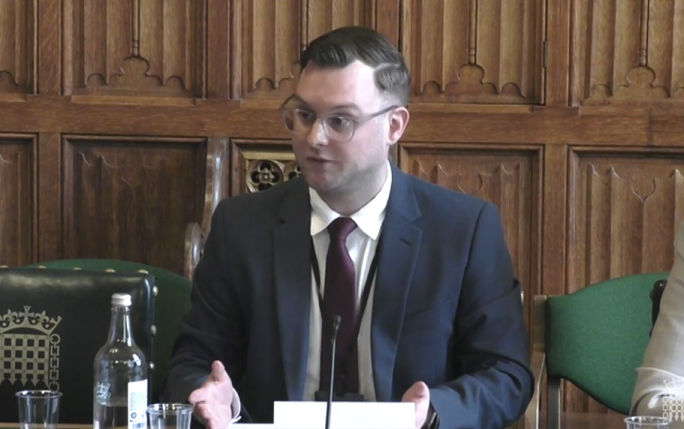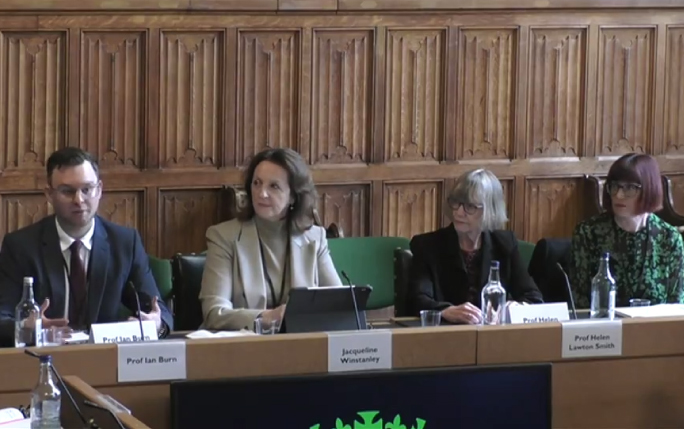Expert stresses low impact of Government’s efforts in tackling disability employment gap at House of Commons

Speaking at the House of Commons, Professor Ian Burn has stressed the low impact of the Government’s latest efforts in narrowing the current disability employment gap (DEG).
During his intervention at the Work and Pension Committee’s inquiry into disability employment held on 1 May, Ian presented novel evidence which corroborates the existence of a sizable and persistent DEG in the UK.
He explained hiring decisions are driven by taste-based discrimination arising from prejudice rather than statistical discrimination based on concerns over employee productivity, as even upskilling candidates -a common policy proposal for reducing the gap- does not have a significant impact in callbacks from employers.
Ian also refuted the idea that organisations advertising themselves as supporting equal opportunities follow through with more inclusive hiring processes, as these display similar discriminatory hiring behaviours than employers which don’t do so.
This includes companies which reference the Disability Confidence employer scheme and those offering remote working opportunities, both emphasised by the Government as effective strategies to reduce the DEG.
Ian was one of the experts invited to answer MP questions during the first session of the inquiry, aimed at finding ways to support disabled people to start and stay in work, and assess the effectiveness of the Government’s efforts to tackle disability-related hiring discrimination.
Less callbacks for wheelchair users
During the session, Ian presented evidence from a field experiment co-produced by Dr Armenak Antinyan and Professor Melanie Jones from Cardiff University, designed to better understand hiring discrimination against disabled job seekers in the UK.
The study, specifically focused on physical mobility, compared the number of callbacks received from 4000 fictitious job applications, half of which stated the candidate was a wheelchair user.
Over the course of a year, the research team applied to all real-world vacancies for accountants and financial accounts assistants posted on a specific job board, as physical impairment for these roles was assessed to have no impact on worker productivity.
They found that “on average, across both occupations, disabled people received about 16% fewer callbacks”, but as Ian noted “if we break it down into the two occupations, accountants didn't have any significant difference in hiring discrimination”.
However, for financial accounts assistants/bookkeepers “the gap was unfortunately 20%”, which demonstrates the difference in callbacks was driven by these less skilled roles.
This is consistent with previous US, EU and UK estimates, which alert of “about 25% to up to 50% fewer callbacks” for disabled applicants, meaning “you have to submit almost twice as many jobs to receive the same number of callbacks if you're disabled”.
Taste-based discrimination as a driver for hiring decisions
Commenting on the potential sources of discrimination, Ian explained that “if you look at financial accounts assistant and bookkeeping occupations, we see that 20% is concentrated on job ads focused on teamwork”.
This indicates hiring decisions are “very much being driven by what we call taste-based discrimination within the UK, which is sort of a dislike for working with disabled applicants, not because of some stereotype about productivity”.
The experiment also revealed some evidence of taste-based discrimination in roles which involved dealing with customers, as “even within the average zero gap for accountants, there was discrimination if the job ad mentioned clients”.
While this was only a requirement for a small number of certified accountant job ads, the data suggests “working externally with clients was a big driver of discrimination within this occupation”.

(L-R) Professor Ian Burn, Jacqueline Winstanley, Professor Helen Lawton Smith and Dr Christine Grant
Upskilling and positive recommendations have little impact on callbacks
In response to a question by David Linden MP, on the potential of upskilling job seekers to alleviate the gap, Ian confirmed that even when a disabled person had more qualifications they would still be more likely to be discounted than a non-disabled candidate.
When the research team upskilled the candidates, they “saw no reduction in the discrimination”.
The team also tested other productivity signals, such as positive letters of recommendation from a previous employer, as these have proven to be effective in tackling other forms of discrimination (eg racial), but they “didn't see any evidence of that for disability”.
Discriminatory hiring practices also among Disability Confident employers
As the inquiry aims to assess the Department of Work and Pension’s national programme for supporting disabled people in work following concerns over its effectiveness, Ian was also asked to comment on the specific hiring behaviour of Disability Confident employers.
Ian stressed organisations which “claim to be part of the Disability Confident employer scheme” or included “equal opportunity indicators on the job ads”, rejected applications “at the same rate as employers who didn't”.
According to Ian, this is “very strong evidence that this is simply a cheap talk on the part of employers” and “a box ticking exercise that looks good for PR purposes, but they don't change the underlying behaviour”.
Higher penalties as deterrent for discrimination
While this suggests being a Disability Confident employer can be an uninformative signal of employer behaviour, he also acknowledged the challenges of tackling taste-based biases, because employers assume “they gain some sort of disutility from working with a disabled person”.
Referring to previous evidence from anti-ageism measures in the US, Ian argued “you have to change the cost benefit analysis that they're doing”, but “if you have very weak penalties for discrimination, you're not going to shift the behaviour”.
While taste-based discrimination “is very hard to prove”, Ian stressed the deterrent potential of imposing “very high penalties”, as this would increase the financial risk of getting caught for employers.
Further elaborating on this, Ian said with these type of practices “you have to almost over exaggerate the penalties to really shift the behaviour”, by changing “the expected value of discriminating”, so “they're very careful not to discriminate because of the costs”.
From a policymaking perspective, Ian concluded by suggesting a more US style approach that “focuses on the penalty lever rather than the enforcement lever”, to improve the effectiveness of the UK’s Equality Act.